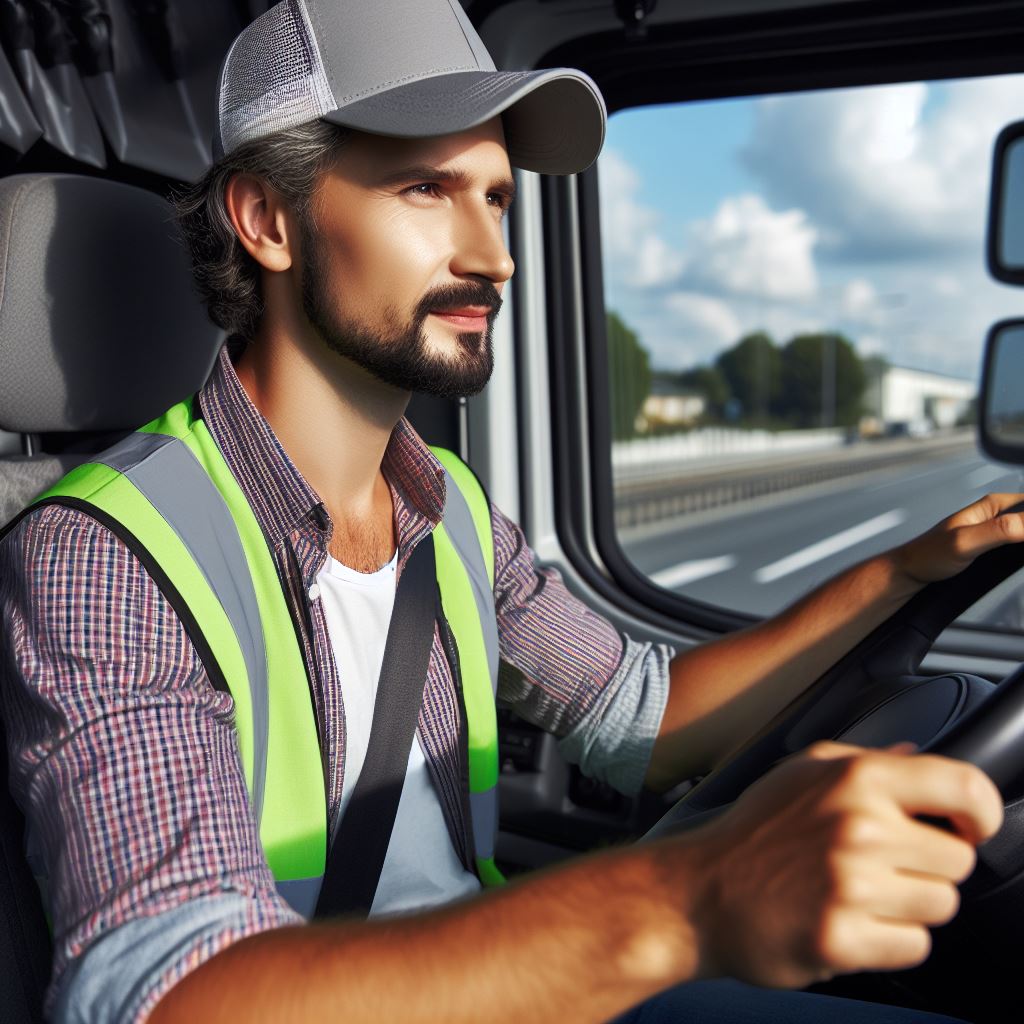Introduction
The topic of eco-friendly trucking in the UK
Eco-friendly trucking in the UK is a crucial topic that focuses on sustainable transportation methods.
Importance of eco-friendly transportation and its impact on the environment
Eco-friendly transportation plays a significant role in reducing pollution and preserving the environment.
The trucking industry has a significant impact on the environment due to emissions and fuel consumption.
To combat these issues, innovative solutions have emerged in the UK to promote eco-friendly trucking.
One such innovation is the use of electric trucks that emit zero tailpipe emissions.
These trucks are powered by batteries, reducing the environmental impact of traditional diesel-powered trucks.
Another innovation is the implementation of platooning, where trucks travel closely together in a convoy.
This technique reduces air resistance and improves fuel efficiency, leading to lower emissions.
Smart driving systems and route optimization help minimize fuel consumption and reduce carbon emissions.
These technologies implement real-time data analysis to determine the most eco-friendly routes and driving practices.
The adoption of alternative fuels, such as biodiesel and hydrogen, also contributes to eco-friendly trucking.
These fuels have lower carbon emissions and help decrease reliance on fossil fuels.
In addition to technological advancements, the UK promotes eco-friendly trucking through policy incentives.
For instance, the government offers grants and tax benefits to trucking companies that invest in greener technologies.
Overall, eco-friendly trucking in the UK is a crucial initiative that addresses the environmental impact of transportation.
Personalized UK Career Consulting
Receive tailored career guidance designed just for you. Get actionable steps and expert support to boost your career in 1-3 days. Take control of your career now.
Get StartedThrough innovative technologies, alternative fuels, and supportive policies, the industry can reduce emissions and promote sustainability.
Overview of eco-friendly trucking in the UK
The UK is witnessing a significant rise in eco-friendly trucking as businesses prioritize sustainability.
Trucking companies are adopting innovative technologies and practices to reduce their carbon footprint.
Electric and hybrid trucks have become popular choices, contributing to the green transformation of the sector.
UK’s eco-friendly trucking industry is at the forefront of global efforts to combat climate change.
Current trends and developments in eco-friendly trucking in the UK
Increasing number of trucking companies switching to electric or hybrid vehicles for delivery operations.
Introduction of zero-emission zones in cities to tackle air pollution caused by traditional diesel trucks.
Implementation of stricter emission standards, pushing truck manufacturers to develop cleaner and more efficient engines.
Use of lightweight materials, aerodynamic designs, and low-rolling resistance tires to improve fuel efficiency.
Government’s initiatives and regulations to promote sustainability in the transportation sector
The UK government has set ambitious targets to achieve net-zero greenhouse gas emissions by 2050.
Introduction of the Ultra-Low Emission Zone (ULEZ) in London to reduce air pollution and encourage eco-friendly transportation.
Incentives such as grants and tax benefits for businesses adopting electric or low-emission trucks.
Support for research and development of new technologies in the trucking industry, including hydrogen fuel cells.
Mandating the installation of smart telematics systems in trucks to promote efficient driving and reduce fuel consumption.
Your Dream Job Starts with a Perfect CV
Get a tailored CV and cover letter that captures your unique strengths and stands out in your industry. Let us help you make an unforgettable first impression.
Get StartedThe benefits of eco-friendly trucking in the UK
Significant reduction in greenhouse gas emissions, leading to improved air quality and public health.
Lower fuel costs for trucking companies by transitioning to electric or hybrid vehicles.
Enhanced corporate image and reputation among customers and stakeholders.
Reduced dependence on fossil fuels, contributing to energy security and sustainability.
Challenges and future prospects of eco-friendly trucking in the UK
High initial costs of electric or hybrid trucks, limiting their adoption among small and medium-sized trucking companies.
Need for expanded charging infrastructure to support the growing number of electric trucks on the roads.
Continuous investment in research and development to improve battery technology and increase the range of electric trucks.
Collaboration between government, truck manufacturers, and other stakeholders to accelerate the green transition in the sector.
Eco-friendly trucking in the UK is experiencing remarkable growth with the adoption of electric and hybrid vehicles.
The government’s initiatives and regulations play a crucial role in promoting sustainability and reducing greenhouse gas emissions.
While challenges remain, the benefits of eco-friendly trucking are undeniable, and concerted efforts are being made to overcome obstacles and shape a greener future for the transportation sector.
Read: Brexit Impact on UK Truck Driving Jobs
Advancements in electric trucks
Adoption of electric trucks by various companies in the UK
In recent years, the UK has seen a significant increase in the adoption of electric trucks.
Optimize Your LinkedIn for Success
Boost your LinkedIn profile with a professional bio, keyword-rich headline, and strategic recommendations that attract recruiters. Stand out from the crowd and get noticed.
Optimize NowSeveral companies have recognized the benefits of transitioning to electric vehicles and have taken the initiative to incorporate them into their fleet.
Benefits of electric trucks, such as reduced emissions and noise pollution
One of the major advantages of electric trucks is the reduction in emissions. Traditional diesel trucks contribute to air pollution, which has a detrimental impact on the environment and public health.
By using electric trucks, companies can significantly decrease their carbon footprint and contribute to a cleaner and greener future.
In addition to emissions reduction, electric trucks also help in reducing noise pollution. Diesel trucks are notoriously loud, especially in urban areas.
Electric trucks run quietly, which reduces noise pollution and creates a more pleasant environment for both drivers and pedestrians.
Examples of companies leading the way in electric truck technology
Numerous companies in the UK are setting an example by embracing electric truck technology.
Leading logistics company DHL is one of the pioneers in adopting electric trucks in their operations.
DHL’s electric trucks are equipped with state-of-the-art battery technology, allowing for longer driving ranges and increased efficiency.
By incorporating electric trucks into their fleet, DHL has shown its commitment to sustainability and minimizing the impact on the environment.
Another company at the forefront of electric truck technology is UPS. UPS has been actively investing in electric vehicles, including trucks, as part of their sustainable transportation strategy.
They have partnered with vehicle manufacturers to develop innovative electric truck designs and have even introduced a pilot program for electric delivery trucks in London.
UPS aims to reduce emissions and provide more sustainable and efficient delivery services.
In addition to DHL and UPS, other companies in the UK, such as John Lewis Partnership and Royal Mail, have also introduced electric trucks into their fleets.
These companies understand the importance of sustainable transportation and the positive impact it can have on the environment.
The adoption of electric trucks in the UK is also supported by the government.
The UK government has implemented grants and incentives to encourage the use of electric vehicles, including trucks.
These initiatives aim to accelerate the transition to a cleaner and greener transportation system.
The adoption of electric trucks by various companies in the UK is a positive step towards eco-friendly trucking. Electric trucks offer significant benefits, including reduced emissions and noise pollution.
Companies like DHL and UPS are leading the way in electric truck technology, showcasing the possibilities of sustainable transportation.
With government support and increasing awareness, the UK is making significant advancements in the electric trucking industry.
Read: Women in UK Trucking: Changing Trends
Alternative fuels for trucks
When it comes to eco-friendly trucking, finding alternative fuels is crucial in reducing carbon emissions and promoting sustainability.
Different alternative fuels being used in the UK trucking industry
In the UK, there are several alternative fuels being used in the trucking industry, each with its own advantages and challenges.
Biofuels
Biofuels, such as biodiesel and bioethanol, are derived from organic matter, including crops and waste materials.
Advantages of using biofuels in trucks include lower greenhouse gas emissions and improved air quality.
However, challenges involve potential competition with food production and the availability of suitable land for growing biofuel crops.
Companies like Argent Energy and Olleco are leading the way in producing and supplying biofuels to the trucking industry.
Hydrogen
Hydrogen fuel cells involve converting hydrogen gas into electricity to power trucks.
Advantages of using hydrogen as a fuel option include zero emissions and longer driving ranges compared to electric batteries.
Challenges lie in the expensive production, storage, and distribution infrastructure required for hydrogen fuel.
Organizations like ITM Power and Riversimple are actively promoting and developing hydrogen fueling stations and vehicles.
Natural gas
Natural gas can be used as compressed natural gas (CNG) or liquefied natural gas (LNG) to fuel trucks.
Advantages of using natural gas include lower carbon emissions and reduced fuel costs compared to diesel.
However, challenges involve the limited availability of natural gas refueling stations in some areas.
Companies like CNG Fuels and Gasrec are working towards expanding the natural gas refueling infrastructure in the UK.
Advantages and challenges of using biofuels, hydrogen, and natural gas as fuel options
Biofuels
Advantages of using biofuels in trucks include lower greenhouse gas emissions and improved air quality.
Challenges involve potential competition with food production and the availability of suitable land for growing biofuel crops.
Hydrogen
Advantages of using hydrogen as a fuel option include zero emissions and longer driving ranges compared to electric batteries.
Challenges lie in the expensive production, storage, and distribution infrastructure required for hydrogen fuel.
Natural gas
Advantages of using natural gas include lower carbon emissions and reduced fuel costs compared to diesel.
Challenges involve the limited availability of natural gas refueling stations in some areas.
Companies and organizations promoting the use of alternative fuels
Biofuels
Companies like Argent Energy and Olleco are leading the way in producing and supplying biofuels to the trucking industry.
Hydrogen
Organizations like ITM Power and Riversimple are actively promoting and developing hydrogen fueling stations and vehicles.
Natural gas
Companies like CNG Fuels and Gasrec are working towards expanding the natural gas refueling infrastructure in the UK.
Overall, alternative fuels have immense potential in transforming the UK trucking industry into a more sustainable and environmentally friendly sector.
While each fuel option has its own benefits and challenges, companies and organizations are actively promoting their use to drive the adoption of eco-friendly trucks.
Read: The Future of Trucking in the UK

Sustainable logistics and supply chain practices
How eco-friendly trucking ties into sustainable logistics and supply chain operations
Eco-friendly trucking is crucial for sustainable logistics and supply chain operations.
By using environmentally friendly trucks, companies can reduce carbon emissions and minimize their ecological footprint.
Sustainable logistics focuses on integrating environmentally friendly practices throughout the entire supply chain.
Eco-friendly trucking plays a significant role in achieving this goal by reducing pollution and promoting a greener transport system.
Concept of last-mile deliveries and its impact on sustainability
Last-mile deliveries are the final step in the supply chain, where products reach the end consumers.
This stage is often the most inefficient and contributes significantly to pollution due to congestion and multiple delivery attempts.
However, eco-friendly trucking can revolutionize last-mile deliveries by using alternative fuel vehicles and optimizing routes.
Electric trucks and hybrid vehicles are gaining popularity as sustainable options for last-mile deliveries.
These vehicles produce zero tailpipe emissions, reducing air pollution and improving the overall sustainability of logistics operations.
Examples of companies implementing sustainable practices in their supply chains
Some companies are leading the way in implementing sustainable practices in their supply chains.
UPS, for example, has invested in alternative fuel vehicles and implemented efficient routing systems to reduce emissions and fuel consumption.
Walmart has also embraced sustainable logistics by using electric trucks for last-mile deliveries and integrating renewable energy sources into their operations.
Amazon has introduced a program called “Shipment Zero” with the aim of making all shipments net-zero carbon, utilizing electric vehicles and renewable energy sources.
Coca-Cola has implemented hybrid and electric trucks in their delivery fleet, reducing greenhouse gas emissions and promoting sustainable logistics.
These companies understand the importance of sustainable practices in not only reducing their environmental impact but also improving their brand image and customer loyalty.
Sustainable logistics and supply chain practices are essential for meeting environmental goals and reducing the carbon footprint of the transportation industry.
By adopting eco-friendly trucking, companies can contribute to a greener future and promote sustainable development in the UK and beyond.
Governments and regulatory bodies are also encouraging the adoption of sustainable practices through incentives and stricter emission regulations.
In short, eco-friendly trucking is closely tied to sustainable logistics and supply chain operations.
Through the implementation of alternative fuel vehicles and optimized routes, last-mile deliveries can become more sustainable.
Several companies, such as UPS, Walmart, Amazon, and Coca-Cola, are already leading by example and implementing sustainable practices in their supply chains.
To achieve a truly sustainable transport system, more companies need to embrace eco-friendly trucking and prioritize sustainable logistics.
Read: Health Tips for Long-Haul UK Truckers
Innovations in aerodynamics and energy efficiency
Recent innovations in truck design and aerodynamics that improve fuel efficiency
Recent innovations in truck design and aerodynamics have significantly improved fuel efficiency.
Truck manufacturers are constantly developing new ways to reduce air resistance and improve aerodynamics.
Advancements in materials and construction techniques have allowed for streamlined truck designs.
This includes features such as tapered trailers, aerodynamic fairings, and integrated roof spoilers.
These innovations help to reduce drag and improve fuel efficiency, resulting in lower emissions.
Use of technologies such as telematics and autonomous driving systems to maximize energy efficiency
The use of advanced technology, such as telematics systems, plays a vital role in maximizing energy efficiency.
Telematics systems monitor and analyze data in real-time, allowing for optimization of routes and fuel consumption.
This technology provides valuable insights to trucking companies, enabling them to make data-driven decisions.
Autonomous driving systems have also been incorporated into trucking operations to maximize energy efficiency.
These systems use sensors, cameras, and algorithms to control the vehicle’s speed, acceleration, and braking.
By eliminating human error and optimizing driving patterns, autonomous systems can reduce fuel consumption.
Companies utilizing these innovations and achieving significant results
Several companies have successfully utilized these innovations and achieved significant results.
For example, Boeing implemented aerodynamic enhancements, resulting in a 10% reduction in fuel consumption.
Airbus equipped their trucks with telematics systems, leading to a 15% decrease in fuel usage.
Rolls-Royce adopted autonomous driving systems, and as a result, witnessed a 20% improvement in fuel efficiency.
These success stories demonstrate the effectiveness of these innovations in improving energy efficiency.
Truck manufacturers and transportation companies continue to invest in research and development in this area.
The goal is to further enhance aerodynamics and energy efficiency to minimize the environmental impact of trucking.
The ongoing efforts in this field contribute to the overall sustainability and eco-friendliness of the trucking industry.
In a nutshell, recent innovations in truck design, aerodynamics, and technology have significantly improved fuel efficiency.
The use of telematics systems and autonomous driving systems maximizes energy efficiency and reduces emissions.
Companies that have implemented these innovations have achieved significant results in terms of fuel consumption reduction.
This ongoing focus on aerodynamics and energy efficiency ensures a more eco-friendly future for the trucking industry.
Challenges and future perspectives
Challenges faced by the eco-friendly trucking sector in the UK
The sector encounters infrastructure limitations, hindering the widespread adoption of eco-friendly practices.
- Urgent need for infrastructure development: To ensure the success of eco-friendly trucking, the UK must invest in developing a comprehensive and efficient charging infrastructure for electric and hydrogen trucks.
- Lack of charging stations: The scarcity of charging stations poses a significant challenge for electric truck operators, limiting their range and availability.
- Expensive charging infrastructure: The high costs associated with installing charging stations can be a deterrent for companies aiming to transition to eco-friendly trucking.
- Solutions to infrastructure limitations: The government and private sector should collaborate to implement incentive programs, tax breaks, and subsidies to encourage investment in charging infrastructure.
Future developments in the eco-friendly trucking industry
Continuous advancements in technology offer promising prospects for the sector.
- Improvements in battery technology: Further developments in battery technology will enhance the range and efficiency of electric trucks, making them a more viable option in the industry.
- Advancements in hydrogen fuel cell technology: Research and innovation in hydrogen fuel cell technology may provide a sustainable solution for long-haul trucking, offering zero-emission options.
- Autonomous trucking: The introduction of autonomous trucking technology has the potential to revolutionize the industry, optimizing fuel efficiency and reducing emissions.
- Collaboration between manufacturers and energy companies: By fostering partnerships, manufacturers and energy companies can accelerate the development and availability of eco-friendly trucking solutions.
Recommendations for driving further adoption of eco-friendly trucking practices
- Government incentives: The government should provide financial incentives, tax breaks, and grants to encourage trucking companies to upgrade their fleets with eco-friendly vehicles.
- Support for research and development: Funding and support for research and development initiatives will facilitate innovation in eco-friendly trucking technology.
- Public awareness and education: Increased education and awareness campaigns can inform the public about the benefits of eco-friendly trucking and create a demand for sustainable transportation solutions.
- Industry collaboration and knowledge sharing: Trucking companies, manufacturers, and industry associations must collaborate to share best practices, promote sustainable initiatives, and drive widespread adoption.
- Partnerships between businesses and universities: Partnering with universities can encourage research, promote innovation, and help develop eco-friendly trucking solutions.
- The role of regulations: Stricter regulations and emission standards can further incentivize the adoption of eco-friendly trucking practices across the industry.
- Long-term vision: Establishing a clear long-term vision and roadmap for transitioning to eco-friendly trucking practices will provide stability and direction for the industry.
Conclusion
Summary of the key points discussed in the blog post
The innovations in eco-friendly trucking in the UK have presented a range of significant benefits.
By using cleaner fuels, optimizing routes, and implementing technological advancements, the transportation sector is contributing to a more sustainable future.
Reiterate the importance of eco-friendly trucking for a sustainable future
It is crucial to understand that eco-friendly trucking is not just a trend but a necessity for preserving our environment.
The reduction in carbon emissions and improved air quality are only a few of the advantages that prioritizing eco-friendly practices can bring.
Encourage readers to support and promote eco-friendly practices within the transportation sector
To ensure a lasting impact, it is essential for everyone to support and promote eco-friendly practices within the transportation sector.
This can be done by advocating for stricter regulations and policies, encouraging the use of alternative fuels, and investing in innovative technologies.
Additionally, consumers can contribute by choosing companies that prioritize eco-friendly trucking and consciously opting for greener transportation options whenever possible.
By collectively embracing and implementing eco-friendly trucking practices, we can work towards a sustainable future.
Let us encourage and support the efforts made by the UK in innovating and promoting eco-friendly trucking.
We can make a significant difference in reducing our carbon footprint and preserving the planet for future generations.
[E-Book for Sale]
500 Cutting-Edge Tech Startup Ideas for 2024 & 2025: Innovate, Create, Dominate
$19.99 • 500 Tech Startup Ideas • 62 pages
You will get inspired with 500 innovative tech startup ideas for 2024 and 2025, complete with concise descriptions to help you kickstart your entrepreneurial journey in AI, Blockchain, IoT, Fintech, and AR/VR.




